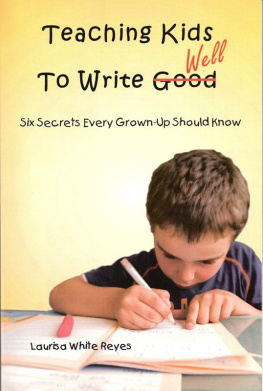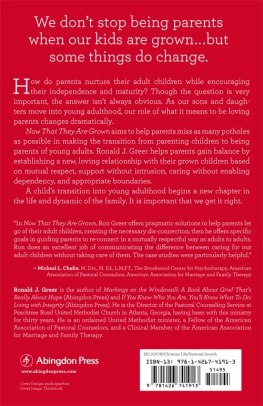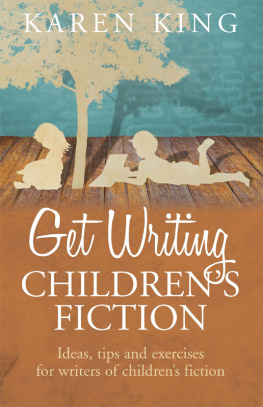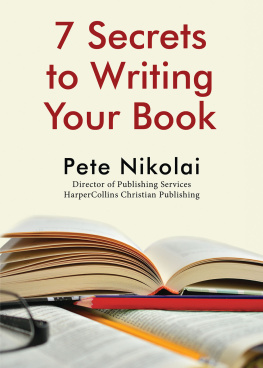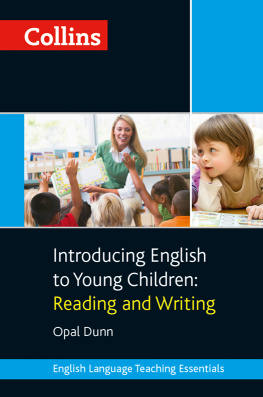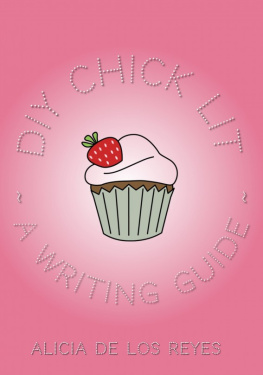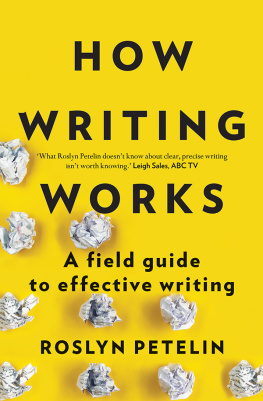

Skyrocket Press
Teaching Kids To Write Well: Six Secrets Every Grown Up Should Know. Copyright 2013 by Laurisa White Reyes
All rights reserved. Printed in the United States of America. No part of this book may be reproduced in any form or by any means without permission in writing from the author.
First Edition published 2009
Other Books by Laurisa White Reyes:
The Rock of Ivanore(Book I of The Celestine Chronicles)
The Last Enchanter(Book II of The Celestine Chronicles)
Published by Tanglewood Press and available in digital and print editions at Barnes & Noble, Amazon, and wherever books are sold.
Authors Website: http://www.laurisawhitereyes.com
Authors Blog: http://laurisareyes.blogspot.com
This book is dedicated to
Elizabeth Rose
INTRODUCTION:
WHY WRITING MATTERS
This book is specifically about writing, but it is also generally about learning. It is about how to stop the negative attitudes about writing that are passed from one generation to another negativity that stunts the imagination and shackles the human spirit. It is about how to let learning become an end unto itself, rather than a grade on a report card, and how to foster within your child a love of the written word as a means of expressing his deepest and fondest desires.
Writing is more than letters of the alphabet or words on a page. It is the second most important means by which humankind communicates with itself, the first being speech. Unfortunately, the English language, both verbal and written, is in decline. With the advent of email and text messaging, the growth of the non-English speaking population, and increased numbers of students who drop out of school, America is experiencing a dumbing down of language. SAT scores for the 2006 graduating high school class show the largest year-to-year decline since 1975. These disappointing results are causing many experts in the educational field to sound the alarm.
In generations past, an individual who could not communicate effectively with others was considered ignorant, uneducated, and unintelligent. Today, poor language skills are trendy and are representative of the American teen culture. However, while it may be popular today for young people to hardly finish a sentence or to write using nothing but acronyms, there will come a day in the not too distant future when their lack of eloquence will become an obstacle in their lives.
The National Writing Project states in their report, Because Writing Matters: Improving Student Writing in Our Schools, In todays business world, writing is a threshold skill for both employment and promotion. In a 2004 survey of 120 major American corporations, respondents emphasized that people who cannot write and communicate clearly will not be hired and are unlikely to last long enough to be considered for promotion.
Those who speak and write well stand out in a crowd. They are confident in themselves, obtain higher levels of education, earn more money in the workforce, and often become the leaders in our society. According to the College Boards National Commission on Writing, two-thirds of salaried workers in large U.S. companies are required to write, yet over three billion dollars are spent annually in trying to improve employees poor writing skills.
Good writing skills are also critical to academic success. A large number of exams given in colleges and universities require essays. But despite the importance of good writing skills in higher education and in the workplace, these skills are in decline.
This is actually good news for your children. In other words, if you are reading this book, you are probably concerned about your childs writing skills and are searching for a way to improve them. By setting your child on the path to more effective written communication, he will one day find himself in that ever shrinking pool of qualified college and/or job applicants who rise, like cream, to the top. Even if your child chooses to remain outside the mainstream workforce by being an entrepreneur or a stay-at-home parent, his excellent writing skills will always play a valuable role in his life.
Research cited in Because Writing Matters shows that writing helps develop thinking and problem-solving skills.
The six secrets discussed in this book are not really secrets at all. Rather they are suggestions on how to create a positive writing environment in your home. Good writing demands an open mind and a positive attitude. Without them writing becomes a chore, or worse, an assignment. While there is nothing wrong with writing assignments, there is something fundamentally distasteful about turning a child off to writing.
At the end of this book you will find a guide to the various stages of learning to write, as well as a description of several teaching strategies to make your childs writing education a success. My intention is to help you, the parent and/or teacher, to help your child discover the joy of writing. Once the door to good writing is flung open, all the barriers and blockades that trip up the rest of us will vanish for your child. He will become an I can person, and the wonderful side effect is that, as his parent and/or teacher, you will, too.
SECRET #1:
LET YOUR CHILD SEE YOU WRITE
I talk and talk and talk, and I havent taught people in fifty years what my father taught by example in one week. Mario Cuomo
Lets be honest. Some of you, after reading the title of this chapter, want to put this book down and walk away. You may be thinking Me? Write? But bear with me here. If you read nothing else in this book, read this chapter.
One afternoon, following one of my writing classes, I chatted with some of my students mothers. I asked them why they enrolled their children in my class. All of these women were intelligent, mature, and confident, but they had one other thing in common: each had had a negative experience when they were children or teens that convinced them they could not write well.
One by one these women shared their stories. A teacher had criticized one in front of her class. Another had a teacher that covered her work in red marks. Still another was given writing assignments that she found boring.
Since then I have discovered that many of us have had similar experiences. As a result of these experiences, many parents do not feel qualified to teach their children how to write beyond the ABCs and simple sentences. Yet if I were to ask these same parents if they were qualified to teach their child to walk, to talk, ride a bicycle, or even to read, they would answer with a resounding Yes! Of course!
Learning to write may not be as simple a task as learning walk or talk, but the process of learning is much the same. There are three basic stages of learning: Discovery, Desire and Discipline. In order for adults to be effective teachers of writing, they must understand their role in helping their children develop through each of these stages.
Discovery
Do you remember the first time you wanted to walk? You were most likely between the ages of eight and fourteen months when you first pulled yourself up to a standing position and grinned proudly at your parents as if to say, See, Mom? See what I just did?
As your legs grew stronger and your balance increased, you took those first hesitant steps cruising along from couch to coffee table to chair to couch again. Finally, with your parents coaxing you with open arms, you gleefully pitter-pattered across the floor into their embraces.
Next page
